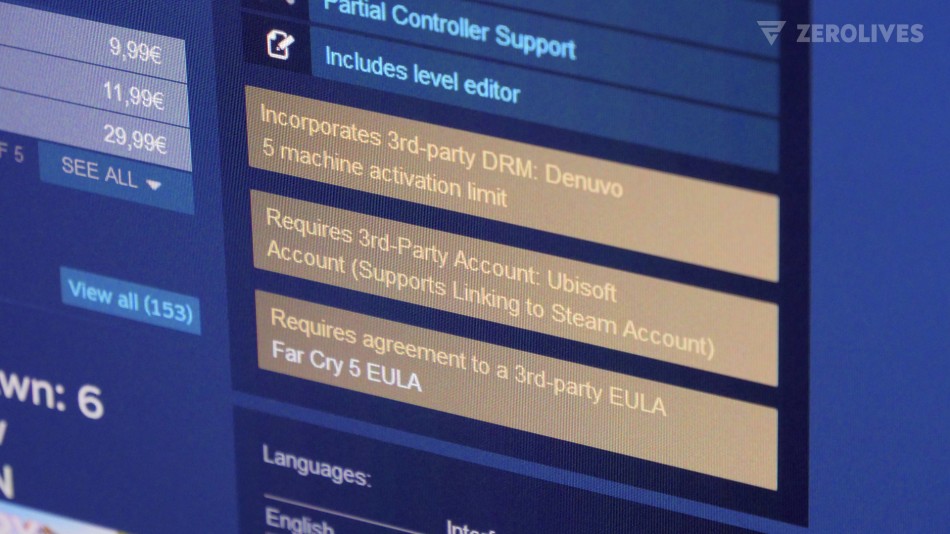More and more major publishers push their own digital stores and DRM launchers, despite it not being in the best interest of their consumers. Instead of releasing their titles through established channels, they would much rather have their consumers jump through hoops. Why is this still a thing?
You discovered a great game either by reading a news article or by watching one of its trailers and thought: "Well, that goes on my wish list", only to figure out moments later that it won't be available on your preferred digital store or that it contains an extra third-party DRM launcher. For PC gamers, this happens all the time.
Major publishers seem to have a hidden agenda of pushing their own digital store or DRM launcher. EA Games' Origin and Ubisoft's Uplay are prime examples of this, and whenever I see a title that is only available through these services I instantly cross it off my list.
EA Games is perhaps the worst of the bunch, making recent entries in the classic Battlefield franchise only available through its Origin store. The last Battlefield game released on Steam is Battlefield: Bad Company 2, which released almost nine years ago in May 2010.
I'd like to think that Ubisoft at least understands that players want to manage their digital library on a single service, so they do, in fact, release their products on Steam. However, the real reason for this is that the studio knows it is missing out on additional revenue by not releasing it there. So, of course, these titles still require Uplay in addition to Steam, making you jump through a significant number of hoops for no good reason.
Activision's 27th Call of Duty game, Call of Duty: Black Ops 4, isn't available on Steam either. Most of us have gotten tired of the franchise many years ago, but those who still wish to play require installing the Battle.net store and launcher.
These practices are by definition anti-consumer as they are improperly favoring the interests of businesses over the interests of consumers.
For these major publishers, not releasing on Steam isn't necessarily related to the 30 percent cut that Valve takes from every sale, but much rather the thought of one day dethroning and replacing Steam, taking the power away from Valve and into their own hands. They hope the popularity of their games is enough to compete with established channels, but it rarely is.
This is why they don't care at all if consumers have to jump through extra hoops to play their games. The digital stores and DRM launchers weren't made for them in the first place; they were made to counter Steam's dominant position in the PC market.
I often wonder if they truly understand how Steam became the titan that it is today: striving to deliver the best user experience, the best game patching service, the best costumer support, and the best consumer policies. That isn't to say Steam is perfect, at least not yet, but in the past 20 years not a single competitor has come along to do it significantly better or different.
With Origin and Uplay consumers get this superficial digital store experience where only a handful of titles are available. Their interfaces are almost always clunky, the software crash-prone, the social experience pretty much nonexistent, and in some worst cases uses a considerable amount of system resources while it is running in the background.
I doubt I am the only one that feels this way, so one would think this anti-consumer practice causes publishers and development studios to miss out on a significant amount of revenue, but this may not be the case at all.
Seeing Ubisoft's Far Cry 5 and Tom Clancy's Rainbow Six Siege being two of Steam's top sellers of 2018 just breaks my heart. Not because these games don't deserve the praise, they do, to some extent at least, but because purchasing these titles also means financially supporting the horrible mess that is Uplay.
That being said, not all third-party stores and DRM launchers are horrible. There are some cases where making games available through a specific digital store makes perfect sense, and some of these digital stores really do have differentiating factors that set them apart from the rest.
Certain MMORPG games aren't even allowed to be listed on most of these established digital stores simply due to the way their in-game stores are set up, clashing with policies. Guild Wars 2 and World of Warcraft are prime examples of this, so third-party stores and launchers make sense there.
Furthermore, CD Projekt's GOG DRM-free offering kept it in the spotlight alongside Steam for the past decade. It is that extra offering that draws those consumers looking to truly own their purchases, and some development studios are keen to support that noble idea.
However, all those other digital stores are nothing but Steam clones, almost always developed by publishers that generate way too much revenue annually, only to annoy consumers in hopes of becoming the next big thing.
Let's be honest: there is no good reason not to release Far Cry 5, Battlefield 5 and Call of Duty: Black Ops 4 on Steam without requiring extra unnecessarily software to be installed other than favoring the interests of business over the interests of consumers.
I'm not saying we should only be using Steam, but I am saying we should be given a choice by releasing titles on multiple digital stores instead of just one.
It is clear that these publishers won't stop pushing their lackluster digital stores and DRM launchers any time soon, so perhaps we, consumers, should send a stronger signal to let them know this really isn't right.
The next time you see a game that requires Origin, Uplay or even Battle.net do us PC gamers a big favor by not financially supporting these anti-consumer publishers.













Comments
This comment has been removed. Gaming was good when it was mostly just Steam, ever since developers took it into their own hands the gaming has been dying and it's more dead than ever on PC.